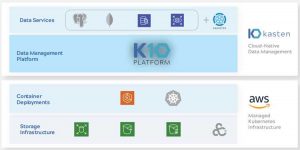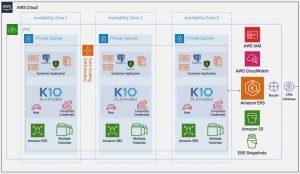Kasten K10 Kubernetes Backup and Recovery Capabilities for Bottlerocket Launch on AWS
Data management platform provides increased security and operational ease for Kubernetes application backup and mobility on open-source OS for containers built by AWS.
This is a Press Release edited by StorageNewsletter.com on September 8, 2020 at 2:14 pmKasten, Inc. announced that its K10 data management platform will provide support for Bottlerocket, an open-source OS purpose-built for hosting containers built by Amazon Web Services (AWS).
K10 With AWS services architecture
Click to enlarge
Security and operational scale are enterprise concerns for container orchestration, and now the company provides critical capabilities for backup and recovery, DR, and application mobility for containerized applications leveraging Kubernetes on Bottlerocket.
AWS Bottlerocket
Click to enlarge
“Security and scale are some of the top priorities for customers running container-based workloads,” said Peder Ulander, director, open source, AWS marketing, AWS. “Our latest collaboration with Kasten builds on our existing relationship to address these priorities for mutual customers. Kasten K10 for Kubernetes application backup and mobility features work on Bottlerocket’s OS to provide customers with a scalable foundation, and adding an additional layer of protection.“
K10 in AWS environment
Click to enlarge
Built by AWS, Bottlerocket is a free and open-source Linux-based OS focused on security and maintainability, providing a reliable, consistent, and safe platform for container-based workloads that can also be used with Amazon Elastic Kubernetes Service (Amazon EKS).
K10’s integration with Bottlerocket enables enterprise operations teams to:
-
Reduce attack surface: Further protection is added by a reduction in the amount of software included in the OS. This eliminates components that can be used in executing or escalating an attack like a shell, interpreters like Python, and even SSH. K10’s integration with AWS services like Amazon Elastic Block Store (Amazon EBS), Amazon Relational Database Service (Amazon RDS), AWS Identity and Access Management (IAM), RBAC for secure operations, and end-to-end encryption also further enhances security posture.
-
Increase operational ease: Bottlerocket uses an image-based update system instead of package-by-package updates to make the OS more consistent and predictable. K10 provides policy driven automation that includes forward looking backup and DR policies. This allows the automatic protection of applications as they are introduced into the Kubernetes cluster.
-
Limit development overhead: Bottlerocket uses containers as its container runtime, which is conformant with the Kubernetes CRI. Developers can take existing containers and run them on Bottlerocket without modification. K10 automatically discovers all the application components running on a cluster and treats the application as the unit of atomicity without requiring development changes. The application, including the state that spans across storage volumes, databases (NoSQL/Relational), and configuration data included in Kubernetes objects such as config maps and secrets, can be seamlessly protected with K10.
“Kasten’s K10 data management platform runs on AWS and is integrated with several AWS services including Amazon EBS, Amazon RDS, and IAM. Enterprises use K10 to perform critical functions like application-centric backup and granular recoveries of their Kubernetes applications running on AWS with Amazon EKS, as well as other Kubernetes distributions,” said Gaurav Rishi, head, product, Kasten. “With the added integration of Kasten K10 on Bottlerocket, customers using the new OS can now also take advantage of the added security and operational benefits like image-based updates.“
Resource:
Blog: Kasten and AWS: Kubernetes Backup and Mobility for Bottlerocket Launch
Read also:
KubeCon and CloudNativeCon Europe: Kasten Unveils K10 Enterprise Data Management Platform
Backup automation and infrastructure portability, capabilities supporting Kubernetes adoption in Europe and regional data sovereignty laws
August 28, 2020 | Press Release
















 Subscribe to our free daily newsletter
Subscribe to our free daily newsletter

